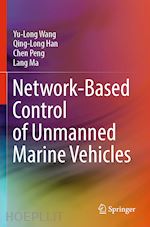
Questo prodotto usufruisce delle SPEDIZIONI GRATIS
selezionando l'opzione Corriere Veloce in fase di ordine.
Pagabile anche con Carta della cultura giovani e del merito, 18App Bonus Cultura e Carta del Docente
This book presents a comprehensive analysis of stability, stabilization, and fault detection in networked control systems, with a focus on unmanned marine vehicles. It investigates the challenges of network-based control in areas like heading control, fault detection filter and controller design, dynamic positioning, and cooperative target tracking. Communication networks in control systems can induce delays and dropouts, so the book presents the importance of stability analysis, stabilize, and fault detection. To help readers gain a deeper understanding of these concepts, the book provides fundamental concepts and real-world examples.
This book is a valuable resource for researchers and practitioners working in the field of network-based control for unmanned marine vehicles.
Professor Yu-Long Wang received the B.Sc. degree in Computer Science and Technology from Liaocheng University, Liaocheng, China, in 2000, and the M.Sc. and Ph.D. degrees in Control Science and Engineering from Northeastern University, Shenyang, China, in 2006 and 2008, respectively. He was Postdoctoral Research Fellow and Research Fellow at Central Queensland University, North Rockhampton, QLD, Australia, an Academic Visitor at the University of Adelaide, Adelaide, SA, Australia, and Professor at Jiangsu University of Science and Technology, Zhenjiang, Jiangsu, China. In 2017, he was appointed as an Eastern Scholar by the Municipal Commission of Education, Shanghai, China, and joined Shanghai University, Shanghai, China, where he is currently Professor.
Professor Wang has been conducting research in the area of networked control systems and motion control of unmanned marine vehicles. He has authored or co-authored more than one hundred (100) fully refereed high quality articles in prestigious journals and leading conferences, where one (1) article in Automatica (one of the top journals in the control field) and twenty (20) regular articles in the most prestigious IEEE Transactions. He received the 2021 IEEE International Conference on Recent Advances in Systems Science and Engineering Best Paper Award and the 2021 International Conference on Life System Modeling and Simulation Best Student Paper Award. He has been Principal Investigator of more than 20 projects granted by National Key R&D Program of China, National Science Foundation of China, and so on. Professor Wang has served as Co-chair of IEEE IES Technical Committee on Network-Based Control Systems and Application; Associate Editor of 2 international journals including “International Journal of Fuzzy Systems,” “ICIC Express Letters, Part B: Applications”; Youth Associate Editor of the international journal “Advances in Manufacturing”; Guest Editor of Neurocomputing, “Special issue on deep learning in distributed and networked complex systems,” and Guest Editor of Electronics, “Special Issue on Recent Progresses and Applications in Automatic Intelligent Control"; Co-chair of the Special Session “Network-based Control Systems and Their Applications,” The 46th Annual Conference of the IEEE Industrial Electronics Society, 2020; Chair of the Special Session “Network-based Control Systems and Their Applications,” The 45th Annual Conference of the IEEE Industrial Electronics Society, 2019; Workshop/Tutorial Chair of the 2018 Australian and New Zealand Control Conference, 2018; Chair of the Special Session “Networked Control and Its Applications,” The 44th Annual Conference of the IEEE Industrial Electronics Society, 2018; Co-chair of the Technical Track “Control Systems and Applications,” The 27th IEEE International Symposium on Industrial Electronics, 2018; Chair of the Special Session “Network-Based Control, Filtering and Their Applications,” The 27th IEEE International Symposium on Industrial Electronics, 2018; and Co-chair of the Special Session “Control and Filtering of Distributed Networked Systems,” The 43rd Annual Conference of the IEEE Industrial Electronics Society, 2017. He is also Member of IEEE.
Professor Qing-Long Han is Pro Vice-chancellor (Research Quality) and Distinguished Professor at Swinburne University of Technology, Melbourne, Australia. He held various academic and management positions at Griffith University and Central Queensland University, Australia. He received the Ph.D. degree in Control Engineering from East China University of Science and Technology in 1997.
Professor Han has been conducting research in the areas of networked control systems, cyber-physical systems, time-delay systems, multi-agent systems, smart grids, offshore structure, unmanned surface vehicles, cybersecurity, and neural networks. Since 2001, as of 11 December 2022, he has authored or co-authored four hundred and fourteen (414) fully refereed high quality journal articles including two hundred and thirty (230) articles in the most prestigious IEEE Transactions and forty-two (42) articles in Automatica. He has also authored or co-authored one hundred and eighty-eight (188) international leading conference papers, six (6) monographs, and one (1) research-based book chapter and edited four (4) conference proceedings and ten (10) special issues. His research work has been cited 42,098 times with an h-index of 113, an i10-index of 369 according to Google Scholar. Moreover, his research work has been cited 35,771 times with an h-index of 107 according to SCOPUS and 32,439 times with an h-index of 103 according to Clarivate Web of Science Core Collection.
Professor Han was awarded The 2021 Norbert Wiener Award (the Highest Award in systems science and engineering, and cybernetics) and The 2021 M. A. Sargent Medal (the Highest Award of the Electrical College Board of Engineers Australia). He was therecipie











Il sito utilizza cookie ed altri strumenti di tracciamento che raccolgono informazioni dal dispositivo dell’utente. Oltre ai cookie tecnici ed analitici aggregati, strettamente necessari per il funzionamento di questo sito web, previo consenso dell’utente possono essere installati cookie di profilazione e marketing e cookie dei social media. Cliccando su “Accetto tutti i cookie” saranno attivate tutte le categorie di cookie. Per accettare solo deterninate categorie di cookie, cliccare invece su “Impostazioni cookie”. Chiudendo il banner o continuando a navigare saranno installati solo cookie tecnici. Per maggiori dettagli, consultare la Cookie Policy.